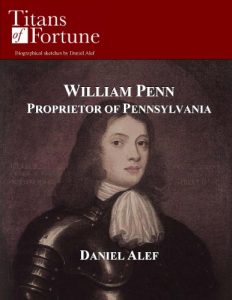Pennsylvania is not named after William Penn who received the 45,000-square mile territory from Charles II in repayment of a debt owed to his wealthy father. Penn wanted to call the land he acquired “New Wales” or “Sylvania,” but Charles II decided on Pennsylvania—Penn’s forest—in honor of Penn’s father. Penn, an early convert to the Quaker faith was the largest individual landowner in the colonies; his lands also including much of present day New Jersey. A rebellious teen, much like today’s youth, Penn and his father had their share of conflict. But after Penn inherited his father's estate and acquired the land in the New World, he created one of the earliest semi-democratic régimes, tolerant of other religions and the Indians who lived there. Yet, Penn was unquestionably the proprietor of his domain; he made all the major decisions. Penn’s unique story, told in award-winning author Daniel Alef’s vivid style, is a significant component of the Colonial period of American history. It is a tale of conflict, success, failure, perseverance, vision and considerable myth; Penn rose from the ashes more than once, only to flounder and fall back just as often. His greatest legacy, however, is the city of Philadelphia, his brainchild. [1,366-word Titans of Fortune article]
This site is safe
You are at a security, SSL-enabled, site. All our eBooks sources are constantly verified.






